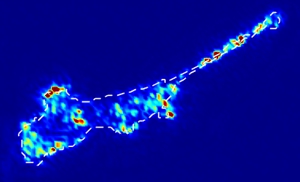 |
Machine Learning for Traction Force Microscopy
Since its introduction 20 years ago, Traction force microscopy has served as a critical tool for understanding mechanical activities of adherent cells. However its resolution and accuracy have been challenged by the mathematical nature as an ill-posed inverse problem. We have now deployed deep learning, which is known for the power for solving ill-posed problems, for traction force microscopy to obtain stress maps at a high resolution, accuracy, and speed. The new method also proves highly versatile with respect to cell shape, size, traction output, and substrate stiffness.  |